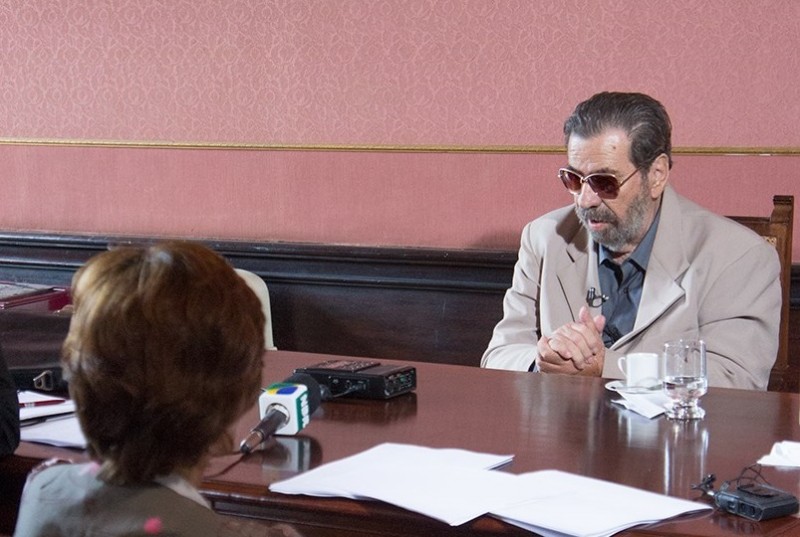
Colonel Paulo Malhães giving his deposition at the Brazilian National Truth Commission in March 2014. Photo by Marcelo Oliveira / ASCOM – CNV
[All links lead to Portuguese-language pages]
At the end of March, retired Colonel Paulo Malhães arrived at the building of the Brazilian National Truth Commission (CNV) sitting in a wheelchair and wearing sunglasses. He was about to begin one of the most powerful depositions to be heard so far on the country’s period of dictatorship, which endured from March 31, 1964 to March 15, 1985.
Just one month later, on April 25, 2014, the confessed torturer and killer was found dead. According to information released by the police, Malhães was held hostage by three men alongside his wife and an employee at his home in Nova Iguaçu, Rio de Janeiro.
The police are considering the theories of destroying files, vengeance and armed robbery – since the robbers made off with the colonel’s personal gun collection – as probable motives for the crime. The coroner's report pointed to death by natural causes. The family has already confirmed that Malhães, 76, suffered from a cardiac condition. The colonel's wife and his employee were left alive.
Still, the CNV asked that the federal police join in the investigation of the case.
Confess, but never regret
According to information published by Carta Capital magazine , during “private depositions” Malhães had testified that he feared for his life. The colonel refused to provide names of government agents who worked with him during the military regime, claiming that “he could not let slip the names because he would be putting his life at risk”.
At the depositions given to Sao Paulo’s State Truth Commission and to the National Truth Commission, Malhães confessed and described the practice of torture, murder and the disposal of bodies – which included removing dental arches and mutilating bodies to make identification more difficult. Last February, he took responsibility for the disappearance of the body of state deputy Rubens Paiva [en], a well-known case from the dictatorship era, but shortly after took back his testimony.
When asked how many people he had killed, the colonel coldly replied, “As many as were necessary”. Since the beginning of the CNV's mission in 2012, Malhães was the fifth agent to testify in front of a public audience, the second one to admit the recurrent practice of torture and the first one to confess his part in such crimes.
He never admitted regret. On the contrary, as soon as the hearing session began, he declared:
Como faço com tudo na vida, eu dei o melhor de mim naquela função. […] Eu cumpri o meu dever. Não me arrependo.
As I do with everything in life, I gave the very best of myself to this job. […] I fulfilled my duty. I don’t regret it.
‘Taking justice into your own hands’
Malhães’ death forced Brazil to see its dictatorship as an age that, perhaps, hasn't ended. It also gave rise to a debate about the criminals of the recent past who never faced punishment. The Amnesty Law, still in effect in the country, does not allow torturers to be brought to trial.
Blogger and activist Douglas Belchior – best know as Negro Belchior – said he felt sorry for the torturer’s death, recalling the wave of popular justice that spread throughout Brazilian cities at the beginning of 2014:
Foi acerto de contas por parte de grupos ligados a resistência à ditadura? Foi vingança por parte de família e amigos de algum torturado? Não acredito. É mais razoável imaginar que se trata de uma ação com a intenção de intimidar possíveis futuros delatores das atrocidades cometidas pelas forças oficiais do Estado durante os anos da repressão.
Mas, quero tratar aqui da mensagem que fica: A ideia da justiça feita pelas próprias mãos. Assassinatos, torturas, desaparecimentos e linchamentos cada vez mais frequentes e banalizados, a começar pela ação das polícias, cujos exemplos não faltam. E que agora se vê promovido por “populares”.
O discurso fascista se fortalece: “É a ausência da lei! Bandido faz o que quer e a população se sente desprotegida. A tendência é que façam justiça com as próprias mãos!”
Was it a settling of accounts undertaken by resistance groups related to the dictatorship? Was it revenge by a torture victim's family and friends? I don’t believe so. It is more reasonable to imagine that it is an action with the sole intention of intimidating possible whistleblowers of the future on the atrocities committed by official forces of the state during the years of repression.
But I want to talk here about the message that stays: the idea of taking justice into your own hands. Murders, torture, disappearances and lynching, more frequent each time and trivialized, beginning with police actions, of which we aren't lacking examples. And that now are promoted by the “people”.
The fascist discourse makes itself stronger: “It is the absence of law! The criminal does whatever he wants to do and the population feels unprotected. The tendency is to take justice into your own hands”.







1 comment